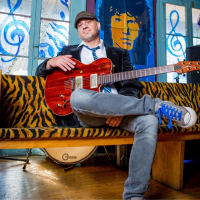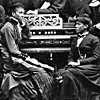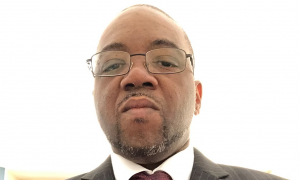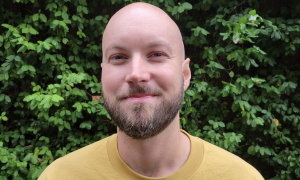Home » Jazz Articles » Chats with Cats » The Publicist: Scott Thompson
The Publicist: Scott Thompson

Getting their name out, getting them known is what I do as a publicist.
—Scott Thompson
About Scott Thompson
Thompson served as Assistant Director of Public Relations for Jazz at Lincoln Center for nearly a decade. He was brought in to help launch the organization's new facilities in the Time Warner Center Building at Columbus Circle in 2004. He was also publicist for Dizzy's Club Coca-Cola. During that time, he established himself as a leading publicist in the entertainment field, garnering praise from peers and music professionals alike.With a background in broadcast journalism, Thompson's voice and work has been heard on the Associated Press Radio Network, the Mutual Broadcasting Network and NBC-AM New York with the Imus In The Morning Show. He has covered everything from Presidential press conferences to hard news in-field assignments. Thompson co-produced the New Haven Jazz Festival from 1994-2000, and worked in the New Haven Mayor's Office of Information. His experience spans radio, television, print and the internet. He knows how to pitch a story and to whom. Thompson has interviewed everybody from the Defense Secretary of the United States to

Frank Zappa
guitar, electric1940 - 1993
A prolific writer, Thompson has contributed to All About Jazz, DownBeat, JazzTimes, Jazziz, and the All Music Guide. He penned the CD liner notes to

Herbie Hancock
pianob.1940

Weather Report
band / ensemble / orchestra
George Duke
piano1946 - 2013

Stan Getz
saxophone, tenor1927 - 1991

Maynard Ferguson
trumpet1928 - 2006

Al Di Meola
guitarb.1954
Scott Thompson: My story starts with

Jimi Hendrix
guitar, electric1942 - 1970
All About Jazz: That's pretty amazing you got to see

Jimi Hendrix
guitar, electric1942 - 1970
ST: I saw Hendrix. So I walked out of there saying, "what just happened?" I've always been a fan of music. I remember sitting in the backseat of a station wagon on the way to grade school, Motown was always on the radio, it was just a very fertile time for music back in the '60s and '70s. We heard everything. I never really had a life plan to be a publicist or to work in music. I was just plodding along.
AAJ: That actually leads me to my first question which is how did you end up in this field?
ST: First of all I'm a music fan, and I love music, and that's what led me to the field. I went to college and studied mass media, advertising, communications and so I have a broadcast journalism background. I developed the art of the interview. It's an art to interview somebody. Especially when you're doing live radio and they're like, "yes, no, yes," and you're like, "oh man this is killing me." A trick of mine is to say something that will piss them off, "yeah what about... I heard that..." and they go "oh no, that's not what happened..." And then we start talking and end up being friends by the end of the interview. It's definitely an art. I literally went from covering a Reagan press conference one day to interviewing

Frank Zappa
guitar, electric1940 - 1993
So I started in radio. Broadcast writing is very short, to-the-point. The "who what where, why, when, and what," in one paragraph. It's perfect for today. With emails we get their attention for eight seconds, I mean, I think it's down to eight seconds before they move on. There's such a proliferation of information now. Everything has changed in my lifetime since I've done this.
So I started interviewing people and before I knew it I had a box of interviews of cassettes. I go, "man I could only use it for a couple of runs on the radio for thirty seconds. I gotta make use of it." Like interviews with

Wayne Shorter
saxophone1933 - 2023

Dizzy Gillespie
trumpet1917 - 1993

Freddie Hubbard
trumpet1938 - 2008
One plays trumpet, one plays alto, and so it was back in the '70s when we moved up north to Connecticut and the New York area. The New York jazz scene was still thriving. I mean all those clubs that are now gone, it was back in the day. I remember seeing

Charles Mingus
bass, acoustic1922 - 1979

Dexter Gordon
saxophone, tenor1923 - 1990
Musicians can tell that I like the music and that's important to them. Before you talk to somebody it's important to research so you know what you're talking about. These guys have been asked the same questions a million times. This is the way of communicating to people and so that's how it started. And I started in radio. I worked in college radio, and eventually on NBC, the Imus in the Morning Show, I was a news stringer. Then I was on Associated Press Radio Network. I was a broadcast journalist. Then I got a job at WJAZ, a jazz station in Stamford Connecticut, and just worked my way up from there.
I mean I've written the CD liner notes for

Herbie Hancock
pianob.1940

Wayne Shorter
saxophone1933 - 2023
I covered the Newport Jazz Festival and went to all the press conferences. I'd see

George Wein
piano1925 - 2021
AAJ: You said you started from a rock background but ended up in the Jazz world. Did you have a love for jazz music or was it something you fell into?
ST: Like I said, my brothers would practice in the garage, with trumpet and saxophone they did a lot of

Cannonball Adderley
saxophone1928 - 1975

Tony Bennett
vocals1926 - 2023

Eric Clapton
guitar and vocalsb.1945
AAJ: What was a typical work day like for you?
ST: Well it's New York. It's busy from the minute you get in. I would commute in from up near New Haven so I did the full Metro-North line all the way down to Grand Central, an hour and a half in, hour and a half out. I'd always be the first one in. I'm the furthest one away and always be the first one in [laughs]. I'd go in and I'd see

Wynton Marsalis
trumpetb.1961
Marketing and PR are kind of close together but there are differences. Marketing, you pay for it. You buy an ad, you know it's going to be there. PR, nothing's guaranteed. You're asking, "can you please review my artist?" So you never know. It's a crapshoot. My style is I have a very easy going personality and it comes across in my style working with the people. Just let me do what I do. I know what I'm doing because musicians are a fun bunch [laughs]. I mean they're artists and it's an ego-driven business you know. You got to believe in yourself to get up on the stage. It's not a negative thing but it's part of the business. So you got to dance around, or whatever you got to do. Just be nice to people. You can get something done by being an a**. Or you can be nice about it and get it done the same way. People respect that and they remember. Who are they going to go back to next time, you know, the a** or the guy who was nice? You start building a roster of clients.
AAJ: You do work for artists directly doing publicity for them. When should an artist hire a publicist?
ST: Well, I stopped working at Jazz at Lincoln Center in 2013 and then I started my own PR business. I had made so many contacts. Every artist that I've worked with has called me. I haven't called anyone. Don't burn your bridges, I've got a good name, I'm well respected in the business. For instance, I got a call from a guitarist, this incredible guitarist Sandro Norton in Portugal. He's like

Pat Metheny
guitarb.1954

Gary Burton
vibraphoneb.1943
AAJ: Why should an artist hire a publicist?
ST: Well back in the day labels would give a lot of support to the artist. In the last decade, and probably less, the whole industry has changed. You know there used to be a lot of labels and as a writer I would get six CDs in the mail every day from labels to be considered for a review. The labels no longer give support to the artist. They have their favorites but it's not like it used to be. That's why musicians today need a publicist more than ever. It's highly competitive. First of all, it's jazz which is like 2% of record sales. You're battling Taylor Swift, Jay-Z, and everything else for airtime. The publicist is a necessity. You need somebody in your corner because you got to get your music heard. I'll say, "well send me a hundred fifty CDs and a hundred fifty-one sheets with basic information on it and I'll get it to radio and get it airplay. I'll get it to editors." You know I've written for all the magazines. I used to write for Jazz Times when it was a newspaper a hundred years ago. It's so competitive—you have to have a publicist.
AAJ: Can an artist do their own PR?
ST: If they can. Musicians are artists. They're meant to make music so they're not necessarily specialized in that. They can do it. But it looks better and more professional if somebody's representing you. It's a necessary evil. It's actually a good thing. Radio stations get piles of CDs in their inbox. It's become so competitive, especially with a lot of people self-producing now there's so much music out there, there's a lot of noise. But they still have to listen to them or it gets in the way of the good music.
A publicist is important establishing the artist's name, getting them known, getting their music heard, getting airplay, getting reviews, promoting their next gig, selling tickets for them. You have to try to pack the house. It's exposure for the artist. My job as a publicist is to get them publicity and that's what I do.
AAJ: You've been doing this for a very long time so you've seen a lot of changes in the business. Can you tell me about the changes brought about by social media and how it effects your job?
ST: Well I'm old school so I'm not real....like the college kids know the social-media thing because it's their generational thing. That's why it's good to have a social media person as well. I do Twitter, and Facebook, and Instagram, and blogs that are out there. With the new social media everything is changing. In five years CDs will probably be obsolete but right now radio still needs CDs. They still have CD players and turntables.
The only place you can hear

John Coltrane
saxophone1926 - 1967

Kenny G
saxophone, sopranob.1956

Jimmy Cobb
drums1929 - 2020

Roy Hargrove
trumpet1969 - 2018

Rudy Van Gelder
various1924 - 2016

James Cotton
harmonicab.1935

Taj Mahal
guitar and vocalsb.1942

Shemekia Copeland
vocalsb.1979

Joe Lovano
drumsb.1952
TV's hard. It's especially hard. It's radio, television, and social media. Social media is the future and streaming is the future. Eventually the old schoolers are going to fade. You know, I don't know what's going to happen. The music business is a crazy business. Technology is driving it all. Everything is getting smaller, more sophisticated...
AAJ: And more immediate, right?
ST: And more immediate, yeah. The immediacy of radio is why radio is the strongest. You get a CD to them it can be on the air that day. Print, ya know the major magazines, they work three months ahead of schedule so everyone's always going, "well, how come you can't get me on the cover of New York Times?" I go, "man, get in line." It's so competitive that my approach is a very soft approach to the editors because I know the deal. They don't want people calling and mailing, "hey, how come you're not playing my record blah blah blah?" I mean if you mail them a CD they know why you sent it to them. You want to get reviewed. I'll send a short email like, "I hope you got it; hope it's good; keep me posted;" just a light reminder. And, like I said, the Jazzizz issue that just came out I have two artists featured in it, and the new Downbeat that just came out, I have two artists that are featured in it. Not many publicists can say that.
AAJ: How do you get an artist to stand out from the rest of the crowd? Is it just from your efforts in promoting them?
ST: There's many elements involved. A lot of it's luck and talent. I mean if it's a name guy that's what's going to get the headline like if it's

Wynton Marsalis
trumpetb.1961
Photo credit: Maria Cabeza
Tags
Chats with Cats
B.D. Lenz
Scott Thompson Public Relations
Scott Thompson
Career
Jazz Professional
Music Professional
Publicity
Public Relations
Comments
PREVIOUS / NEXT
Support All About Jazz
 All About Jazz has been a pillar of jazz since 1995, championing it as an art form and, more importantly, supporting the musicians who make it. Our enduring commitment has made "AAJ" one of the most culturally important websites of its kind, read by hundreds of thousands of fans, musicians and industry figures every month.
All About Jazz has been a pillar of jazz since 1995, championing it as an art form and, more importantly, supporting the musicians who make it. Our enduring commitment has made "AAJ" one of the most culturally important websites of its kind, read by hundreds of thousands of fans, musicians and industry figures every month.





 Buy Now
Buy Now























